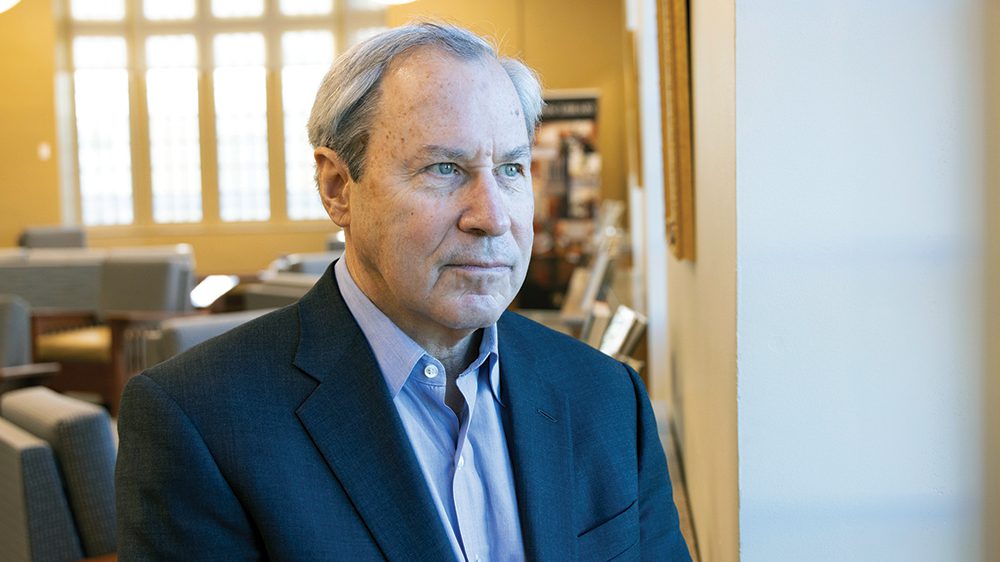Williamson ’72: In Gratitude for Two Generations

Thomas Williamson ’72 established the Thomas W. Williamson 1942 & 1972 Scholarship, which provides need-based aid to a cadet showing academic promise.—Photo by Micalyn Miller, VMI Alumni Agencies.

Thomas Williamson ’72 established the Thomas W. Williamson 1942 & 1972 Scholarship, which provides need-based aid to a cadet showing academic promise.—Photo by Micalyn Miller, VMI Alumni Agencies.
For Thomas Williamson ’72, giving back isn’t just a nice thing to do; it’s a statement of gratitude for all that VMI provided, both for him and his father.
The Williamson family story begins in the late 1930s when Thomas “Tommy” Williamson ’42 left his Harrisonburg, Virginia, home and matriculated at VMI. As a child of the Depression, Tommy needed financial assistance to attend the Institute, and he received a state cadetship to defray the cost.
Just a few months after the Japanese attack on Pearl Harbor, in March 1942, Tommy graduated from VMI early with a Bachelor of Arts degree in history. Thirty years later, in spring 1972, his son, Thomas “Tom” Williamson Jr. ’72, likewise graduated from VMI, earning the same degree as his father.
In gratitude for all his family has received from the Institute, in 2015, Williamson established a scholarship in memory of his father, one of the hundreds of VMI alumni to serve in World War II.
Tommy’s World War II story is one of courage, a horrific war wound, and a “never say die” spirit of persistence in the postwar years despite a lifelong disability.
After wearing academic stars during his cadetship and graduating into the maelstrom of World War II, Tommy commissioned into the Army. In 1944, he was sent to Europe to serve with the 11th Armored Division, part of the Third Army commanded by Gen. George S. Patton III, Class of 1907.
On Dec. 30, 1944, during the Battle of the Bulge, his company commander was killed, and Tommy found himself leading 140 men in the face of fierce German resistance. According to the memoirs of one of the men serving under him, “Lieutenant Thomas Williamson, a graduate of Virginia Military Institute, … was well respected and liked. He assumed command of the company immediately, thus bringing to us the sense of stability that we desperately needed.”
Just three days later, Jan. 2, 1945, shrapnel from a German tank ripped through Tommy’s skull. Williamson, now an attorney practicing in Richmond, Virginia, called his father’s survival “miraculous.”
Tommy went on to graduate from law school, marry and raise a family, and live to the age of 69—all with a metal plate in his head replacing the missing pieces of his skull. But the traumatic brain injury paralyzed the right side of his body and caused cognitive deficits. Williamson recounted how his father struggled without success to pass the Virginia bar exam, which at that time required handwritten essays. The injury had reduced Tommy’s handwriting to a hard-to-decipher scribble.
As the child of a disabled combat veteran, Williamson qualified for a government assistance program that paid his tuition at VMI—helped just as his father had been 30 years earlier. “So here we are, two generations that have been able to go to VMI and finish our cadetships free of debt,” Williamson noted. “This history has definitely impacted my view of financial aid for cadets.”
In 2013, Williamson began serving on the VMI Foundation Board of Trustees, a position he would hold through June 2021. Knowing how much his family had benefited from being able to attend VMI without loans, he established the Thomas W. Williamson 1942 & 1972 Scholarship, which provides need-based aid to a cadet showing academic promise.
By that point, of course, Williamson’s law practice was well established, but even when he was a young alumnus, he’d always supported the Institute financially. “It’s sort of in my DNA, I guess,” he remarked. “Giving back to VMI is something that’s important. I could do it, and I wanted to do it.”
Over the years, Williamson has attended a few luncheons for scholarship donors and recipients, and he’s also received hand-written letters from grateful cadets, including from a cadet who hoped to follow her benefactor into the practice of law.
By supporting cadets, Williamson knows he’s building a stronger VMI—because students are at the heart of any institution of higher education.
“You can have all the infrastructure, fancy gyms, great food in your dining hall,” Williamson commented. “But the Institute is never going to be stronger than the potential of its matriculating cadets. For me, scholarship aid is paramount. … Every cadet should have sufficient financial aid so they can flourish during their cadetship and then go out into the world and do great things without being encumbered by any debt.”

The development writer plays a key role in producing advancement communications. This role imagines, creates, and produces a variety of written communication to inspire donors to make gifts benefiting VMI. Utilizing journalistic features and storytelling, the development writer will produce content for areas such as Annual Giving, stewardship, and gift planning.